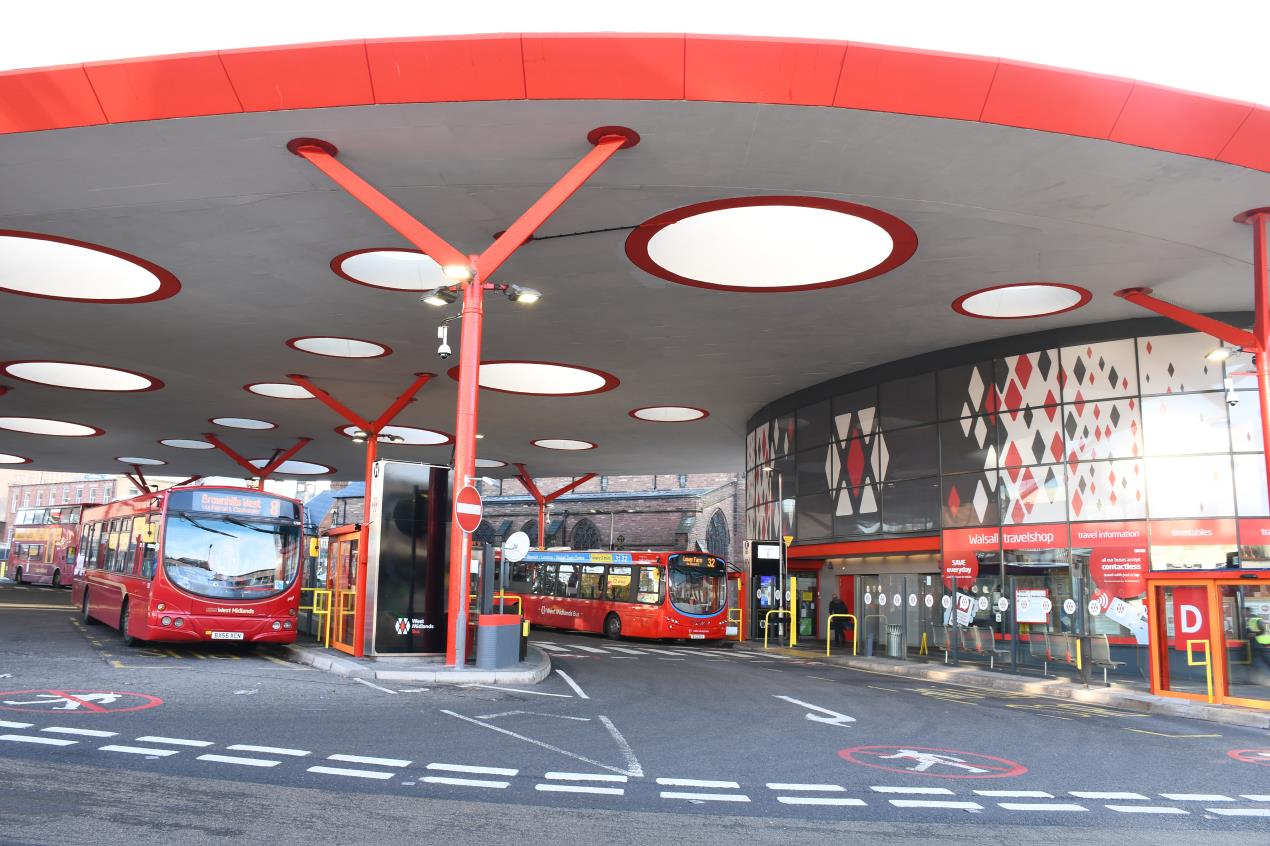Lower fares and more uniformed safety officers part of £88m plan for bus services across West Midlands
Published: Friday 10 Jun 2022
Plans to introduce more transport safety officers and a streamlined fare structure are included in an £88 million package of measures designed to transform bus services over the next three years.
Further proposals outlined in the region's Bus Service Improvement Plan (BSIP) will see greater coordination between Transport for West Midlands (TfWM) and private operators, improvements to the bus network and more targeted fare offers and flexible ticketing to encourage new and returning customers onto buses.
TfWM, which is part of the West Midlands Combined Authority (WMCA), drew up the plan in answer to the Government's ‘Bus Back Better' call for proposals to improve bus services following the Covid pandemic.

Walsall Bus Station
The plan was today given the green light from the WMCA Board and will now be submitted to the Department for Transport for approval and funding.
This funding is in addition to the £162 million capital investment, being delivered through the City Region Sustainable Transport Settlement, to create 50km of new bus priority routes and cross-city services, as well as investment in improvements to smart ticketing, demand-responsive transport and live travel information.
Key features for the £88 million transformation plan include:
• Lower and streamlined fares - with prices frozen to 2018 level until 2025
• Enhanced bus network with greater operating hours, increased frequency and greater integration with other transport services
• Boost the Safer Travel team with nine extra uniformed transport safety officers to offer greater protection and reassurance to passengers
• Create a Bus Passenger Charter to set out clear pledges for customer satisfaction and retention
TfWM, councils and operators already work closely through the West Midlands Bus Alliance and our existing Enhanced Partnership will be extended to support the BSIP delivery.
Andy Street, Mayor of the West Midlands and WMCA chair, said: Travelling by bus remains a popular choice for West Midlands residents. Pre pandemic, we were the only region outside London where bus passenger numbers were increasing - helped of course by our lower fares and offers like half-price for apprentices.
Now we want to see our bus services bounce back from Covid and this plan sets out how we will go about doing just that - winning back not just existing customer loyalty but also encouraging even more people to give the bus a go.
We are setting out how we are making bus journeys more comfortable, more convenient, and more affordable - not to mention safer by increasing the numbers of uniformed and visible transport safety officers out on patrol across the bus network
The report to the WMCA Board also warned of risks of some bus services being lost at the same time as Covid-19 support funding handed to operators from Government throughout the pandemic is withdrawn later this year and operators face the challenge of rising fuel costs. TfWM will continue discussions with Government over support for existing bus services.
Cllr Ian Ward, WMCA portfolio holder for transport and leader of Birmingham City Council, added: Government Covid support for bus operators is due to end this year - meaning this investment to reduce fares and improve services is even more vital to not only get those customers lost during the pandemic back on board but attract new customers.
And it will of course be accompanied by further investment in bus lanes and bus priority measures which will allow buses to bypass traffic jams while offering more reliable journey times.
Bus is the most used form of public transport and quality services are essential if we are to reduce car use, ease congestion, cut pollution and help tackle the climate emergency